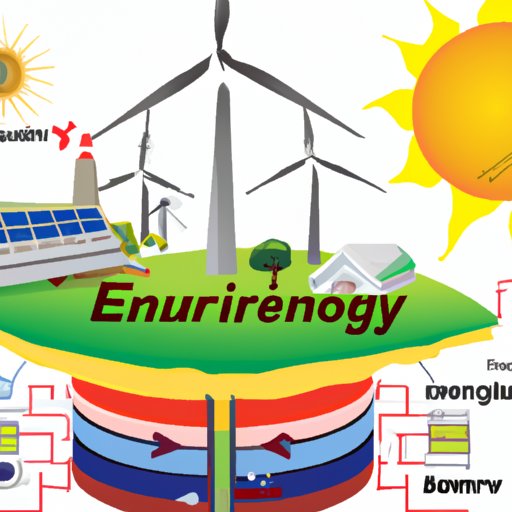Introduction: What is Energy Science and How Does It Work?
Energy science is a field of study that focuses on the production and use of energy, examining how different sources of energy can be harnessed and applied to meet the needs of society. It also looks at the environmental impacts of different energy sources and investigates ways to reduce them. By understanding the principles of energy science, we can make better decisions about how to use energy resources responsibly and sustainably.
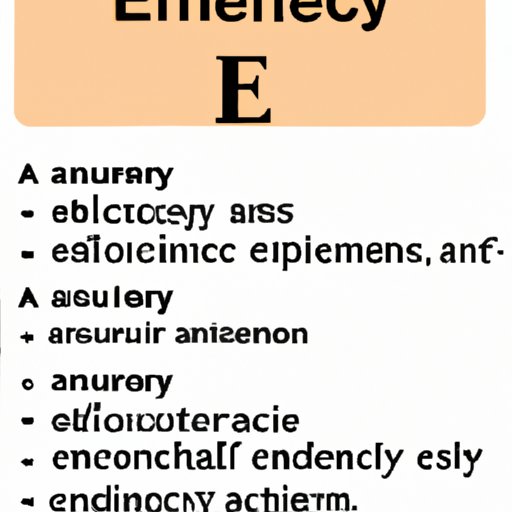
A. Definition of Energy Science
In the words of Professor Paul L. Joskow of the Massachusetts Institute of Technology, “Energy science is the application of scientific knowledge to the production and use of energy.” This includes understanding the physical and chemical properties of different energy sources, their potential applications in various settings, and their impacts on the environment. Energy science is closely related to the fields of physics, engineering, and environmental science, as it involves the study of energy from multiple perspectives.
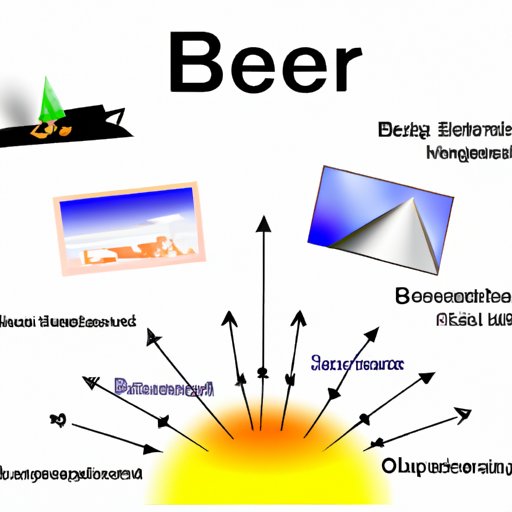
B. Overview of Different Sources of Energy
There are many different sources of energy available, including fossil fuels, nuclear power, and renewable energy sources such as solar, wind, and hydropower. Fossil fuels, such as coal, oil, and natural gas, are derived from the remains of ancient plants and animals and are burned to generate electricity. Nuclear power is generated by splitting atoms in a process called fission. Renewable energy sources, meanwhile, are those that can be replenished naturally, such as solar, wind, and hydropower.
Examining Different Sources of Energy and Their Uses in Society
A. Fossil Fuels
Fossil fuels are the most widely used source of energy in the world today, providing about 80 percent of the world’s total energy supply. They are relatively cheap and efficient to produce, but they have significant environmental impacts, including air pollution and the emission of greenhouse gases. According to a study published in the journal Nature, fossil fuel burning was responsible for about two-thirds of global carbon dioxide emissions in 2018.
B. Nuclear Power
Nuclear power is another major source of energy, accounting for around 11 percent of global electricity generation. Nuclear power plants use uranium as fuel, which is split in a process called fission to generate heat. This heat is then used to create steam, which drives turbines to generate electricity. While nuclear power is clean and efficient, it has safety concerns associated with it, such as the potential for radiation leaks or accidents.
C. Renewable Energy Sources
Renewable energy sources, such as solar, wind, and hydropower, are becoming increasingly popular as an alternative to fossil fuels and nuclear power. These sources of energy are clean, renewable, and have minimal environmental impact, making them attractive options for electricity generation. In addition, they can be relatively inexpensive to install and maintain. For example, according to a study by the International Renewable Energy Agency (IRENA), the cost of generating electricity from solar photovoltaic systems has declined by 73 percent since 2010.
Investigating the Impact of Energy Science on Climate Change
A. Greenhouse Gases and Global Warming
The burning of fossil fuels is one of the leading causes of global warming and climate change. When these fuels are burned, they emit greenhouse gases such as carbon dioxide and methane into the atmosphere. These gases trap heat from the sun and cause the earth’s temperature to rise, resulting in climate change. According to the Intergovernmental Panel on Climate Change (IPCC), global temperatures have risen by about 1 degree Celsius since pre-industrial times, largely due to human activities such as the burning of fossil fuels.
B. Impacts of Climate Change on the Environment
The effects of climate change are far-reaching and can be seen in many different aspects of the environment. Rising temperatures can lead to droughts, floods, and extreme weather events, while melting polar ice caps can cause sea levels to rise. Climate change can also have an impact on biodiversity, as plants and animals struggle to adapt to changing conditions. According to a study by the World Wildlife Fund, more than one million species are currently at risk of extinction due to climate change.
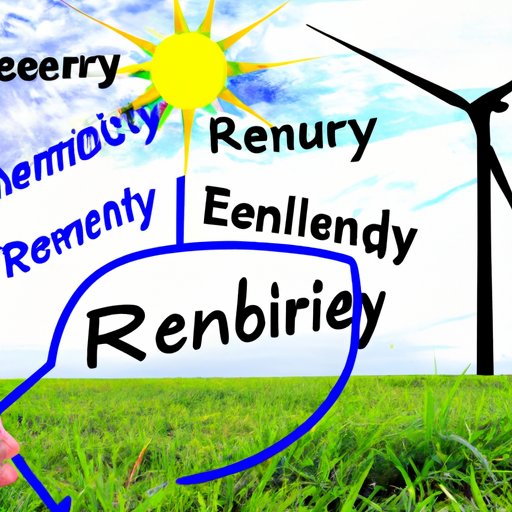
Analyzing the Role of Renewable Energy in Achieving Sustainability
A. Benefits of Renewable Energy Sources
Renewable energy sources offer a number of advantages over traditional fossil fuels. They are clean and have minimal environmental impact, so they can help to reduce greenhouse gas emissions and slow the rate of climate change. They are also renewable, meaning they will never run out. Additionally, renewable energy sources can be relatively inexpensive to install and maintain, making them attractive options for electricity generation.
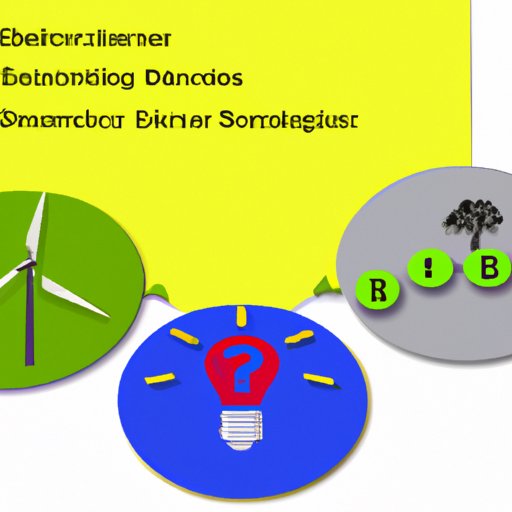
B. Challenges to Implementing Renewable Energy
While there are many benefits to using renewable energy sources, there are also some challenges that must be addressed. One of the major challenges is the cost of installation, as renewable energy technologies can be expensive to set up. In addition, renewable energy sources are often intermittent, meaning they cannot always provide a steady supply of electricity. Finally, there is the challenge of storage, as renewable energy must be stored when it is not being used in order to be used effectively.
Understanding the Benefits of Energy Science for Developing Nations
A. Access to Cleaner and More Affordable Sources of Energy
Energy science has the potential to improve access to cleaner and more affordable sources of energy in developing countries. Renewable energy sources, such as solar and wind, are becoming increasingly accessible and cost-effective, making them attractive options for electricity generation in areas without access to traditional grid infrastructure. In addition, new technologies, such as off-grid solar systems, are making it easier and cheaper to access renewable energy in remote areas.
B. Improved Quality of Life for People in Developing Countries
Energy science can also help to improve the quality of life for people in developing countries. Access to reliable and affordable sources of energy can help to improve access to healthcare, education, and other essential services. It can also provide opportunities for economic development and job creation. According to the United Nations Development Programme, access to energy is essential for achieving the goals of sustainable development.
Conclusion
of Key Points
This article explored the concept of energy science, discussing different sources of energy, their implications for climate change, and the role of renewable energy in achieving sustainable development. We looked at the different sources of energy available, including fossil fuels, nuclear power, and renewable energy sources such as solar, wind, and hydropower. We also examined the impact of energy science on climate change and the benefits of renewable energy for developing nations.

B. Final Thoughts on Energy Science
Energy science is an important field of study with far-reaching implications for our planet and its inhabitants. By understanding the principles of energy science, we can make better decisions about how to use energy resources responsibly and sustainably. We can also work towards creating a more equitable and prosperous future for all by increasing access to cleaner and more affordable sources of energy in developing countries.
(Note: Is this article not meeting your expectations? Do you have knowledge or insights to share? Unlock new opportunities and expand your reach by joining our authors team. Click Registration to join us and share your expertise with our readers.)
